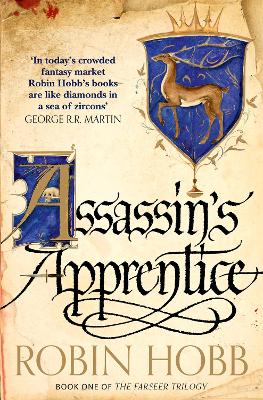Reviewed by Briana @ Pages Unbound on
The novel is structured such that each chapter begins with an except from the history that a future version of the protagonist is writing. While this can be a handy way to convey world-building, including necessary information about the history, people, and magic of the fantasy world, something about it also seems lazy. Hobb doesn't utilize the form to it best advantage. Instead, these excepts are scattered and confusing. Some are long, some short. They jump around in time. A few give information vital to the present plot, easily missed for anyone sick of the excerpts and skimming, while others seem tangential to the story as a whole. I didn't really know what to make of them, except that I didn't want to read them but there were apparently a few key times I had to.
In the story proper, action is also lacking. I admit it: fantasy is genre fiction and there are conventions I expect from it. One of these conventions is plot. However, instead of providing a fast-paced tale of intrigue and adventure, Hobb provides a character sketch of protagonist Fitz. Most of the book is spent inside his brooding mind, which could be interesting if his thoughts weren't close to monotone. Fitz is cynical, bitter, judgmental, and certain he's smarter than nearly all those around him. While he certainly has good reason for bitterness, the mood doesn't fit his entire character arc. The story follows Fitz from the age of six through his teenage years, but he skips childhood and adolescence and consistently sounds like a grumpy middle-aged man. Age-appropriate character development and voice would have made this novel realistic and helped it resonate with me more.
There were a few key moments in the book where I really wanted to keep reading to find out what happened next. Most of these are near the end of the book, however, and I was pretty close to setting the book aside as a DNF before I ever reached them. It is many chapters before Fitz begins doing what the book promises, working as an assassin, and many more chapters before readers get in-depth looks at what this entails. I can get behind a book that's about training to do a certain job, but the training in Assassin's Apprentice never receives the proper detail and attention, as though the author thought this is actually tangential to the point, even though it comprises the majority of the novel.
Assassin's Apprentice is a dry read, one that I don't particularly care to repeat. This series has two more books, and after that the author has written even more about Fitz. I won't be reading any of these books but will instead move on in my quest to find engaging epic fantasy.
Reading updates
- Started reading
- 6 September, 2015: Finished reading
- 6 September, 2015: Reviewed
